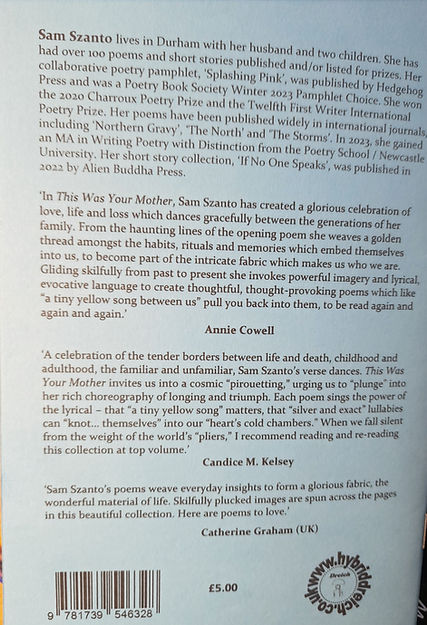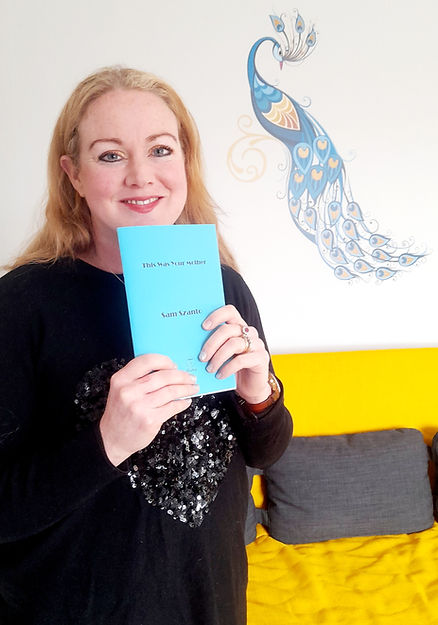Zary Fekete: 'Sobriety is a fragile thing'
- samszanto2
- Jul 13, 2024
- 5 min read

A chat with Zary Fekete about their recovery collection, To Accept the Things I Cannot Change: Writing My Way Out of Addiction (Creative Texts Publishers, LLC, 2024)
How would you describe To Accept the Things I Cannot Change: Writing My Way Out of Addiction in one sentence?
It is a series of stories, each one reflective in some manner of what recovery has meant to me personally.
How long did the book take to write?
I began my recovery journey in 2018, but I didn’t start writing until 2020. Consequently, my first two years of recovery contained within them some of the seeds which would ultimately come to fruition through the stories once I began to writing them. The literal writing of the stories contained in this book happened between 2020 and 2023.
How did you structure the collection?
Each story begins with a quote from the Alcoholics Anonymous Big Book, a text that many in the recovery community consider to be their Bible. The Big Book was helpful to me in my initial stages of recovery. However, even after I moved on from the Big Book, I continued to return to its opening chapter because it begins with the personal story of Bill W. (the founder of AA). The story is well written and has the flavour of a mid-century short story (one perhaps written by John Cheever or Patricia Highsmith). As a writing exercise I decided to write a series of shorts, each one propelled by a quote from the opening chapter of the Big Book. Some of the pieces ended up being fairly short, others were longer. So, when I compiled the book, I staged in into three sections from shortest pieces to longest.

How did you choose a publisher?
Once I had the collection assembled, I began to shop it around to a number of different publishers. Like most writers in their beginning stages, I received many, many rejections over the course of about nine months. Then, one day, I received an email from the founder of Creative Texts. He and his wife worked together on finding material. They were one of the many places I had submitted the book. When his wife read some of the initial pages, she recommended to her husband that he get in touch with me. And, there you have it😊
Why did you decide to combine fiction with memoir?
I love to take long walks and long jogs. Many of my ideas for pieces will come from a particular moment during a jog. Sometimes the ideas will be fictional and other times it will be a thought based off of some actual event from my life. Probably 75 percent of what I write is fictional and 25 percent is memoir-based. And, of course, because this writing is ultimately based off of my experience in recovery, all of it has some basis in reality, even if it is merely in a particular framework or a unique perspective on some aspect of life.
What has been the reaction to the collection? Have there been any individual reactions that have surprised you?
I have received the most concrete reaction not to the individual stories themselves but to the event to my recovery. When I started to promote the book I received overwhelming support from people in my friend-network, many of whom I had not interacted with for a number of years. Some of them didn’t know I had gone through recovery or even that I had an alcohol addiction. In that way, the experience of writing the book and putting it into the world was another helpful step in my recovery process because it was another moment of admission and another opportunity to come clean.
How does it feel to have the book in the world? Was there some fear involved in handing over your stories (and I assume, other people’s)?
It is tremendously gratifying! And the experience has brought with it some personal moments of tenderness. I was contacted by a few different friends who had their own journey through recovery. The process of writing the book and putting it into the world allowed me to get to know some people more deeply than I might have without it.
You’ve had quite a few books out in the last couple of years – what motivated you to put this particular one out now?
I write quite a lot. Because of this, I also submit quite a lot. And it didn’t take too long before I realized at the end of 2022 that I probably had enough to make up a collection, specifically a collection focused around the theme of recovery writing. I have had the fortune to meeting and befriending many other people going through various stages of recovery. We all have developed various ways of coping with recovery, and I was not the only one who found solace through writing. I hoped that having a collection of this kind of writing might be a source of help and motivation for others in the recovery world.
Were you inspired by any other recovery collections / books?
Strangely enough, the most motivating books for me in this particular vein of thought were illness memoirs. I have read quite of few of those in the past two years. Two that really stand out are Sarah Manguso’s The Two Kinds of Decay and Ross Douthat’s The Deep Places.
Can you talk a bit about the nature of the recoveries in the stories? Sometimes the idea of recovery feels so subtle, it wasn’t clear to me how it manifested in all of them. In stories like ‘Dancing Suzie’, for example. This isn’t meant to be a criticism, for me it’s one of the things that makes the book so intriguing.
That’s a great question! Sometimes the thread connecting the individual pieces to recovery itself is very slender. In “Dancing Suzie” the story I see is one of protection. Sobriety is a fragile thing. It is easy to begin but very easy to break. In that story the boy realizes the girl is being threatened, but he didn’t see it on his own. She needed to reach out to him in order to protect herself. Sometimes I feel moments during a normal day when my sobriety taps on my shoulder and reminds me how delicate it is and how easy it would be to lose it if I wasn’t vigilant.
Some of the pieces are extremely short, others not. This might be an impossible question to answer, but do you know before you start writing whether you’ll be writing a micro or a piece of short fiction? What is the process?
I can usually tell when I have an idea whether the piece feels like it will be short or long. Sometimes I will be surprised when I finish the piece, perhaps having expected it to be even longer or shorter. I can tend to be impatient😊 Sometimes I know I piece needs to be longer, but I won’t always give it the space it needs. I have sometimes ended a piece too soon, and then, if I’m wise, I will sit on it for a few days and then pick it up again and give it some more thought. The shorter pieces are usually designed to be quick reads.
As I’m sure I said in my last interview with you, you’re so prolific! What’s next for you?
I have another full-length collection of creepier short stories coming out from Gnashing Teeth Publishing in late October/early November, just around Halloween time. I have a short novel I wrote last year that I am polishing and hope to find a place for it in the upcoming months. I also have another collection of short stories organized around the theme of personal faith. I’m still assembling that collection. We’ll see where it goes. And then, of course, I am still writing fairly routinely each day and finding online places who are kind enough to publish my work.
Buy To Accept the Things I Cannot Change: Writing My Way Out of here: https://www.amazon.com/dp/1647381096










Comments